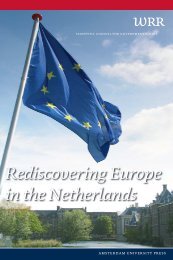The Western Condition - St Antony's College - University of Oxford
The Western Condition - St Antony's College - University of Oxford
The Western Condition - St Antony's College - University of Oxford
Create successful ePaper yourself
Turn your PDF publications into a flip-book with our unique Google optimized e-Paper software.
An ambivalent decade: Three variations in the AKP’s foreign policy<br />
hardware to the Assad regime. Although the origin <strong>of</strong> this tension can be traced to Turkey’s<br />
acceptance <strong>of</strong> NATO radars in its territory, not far from the Russian border, the Syrian civil war<br />
has further cast the two countries on the opposite ends <strong>of</strong> the regional divide and, despite<br />
<strong>of</strong>ficial statement to the contrary, triggered a period <strong>of</strong> mutual distrust that has revived memories<br />
<strong>of</strong> the Cold War. 122<br />
In Syria, Turkey may have overplayed its hand. Having turned down <strong>of</strong>fers <strong>of</strong> international<br />
assistance and monitoring when the first Syrian “guests” fleeing the conflict arrived on its soil,<br />
Foreign Minister Davutoğlu appealed to the UN Security Council to take action as the conflict<br />
wore on and the bulging number <strong>of</strong> people pouring over the border added to the economic and<br />
logistical burden on the AKP government. 123 <strong>The</strong> government has also increasingly found itself<br />
facing challenges from three different sources: first, from the Syrian army, which has repeatedly<br />
shelled Turkish towns along the border; second, from a rising number <strong>of</strong> Salafist fighters, over<br />
whom the government has little control or influence, moving in and out <strong>of</strong> Turkey in relative<br />
freedom; 124 and third, from the growing Kurdish insurgency inside Turkey, which is directly<br />
linked to the de facto autonomy that Syrian Kurds have attained when the Assad regime practically<br />
yielded control over a number <strong>of</strong> Kurdish towns to the Democratic Union Party (Partiya<br />
Yekîtiya Demokrat, PYD), a close affiliate <strong>of</strong> the PKK in exchange for non-hostility. 125<br />
Indeed, hardliners within the PKK have been emboldened by the breakdown <strong>of</strong> Turkey’s<br />
security cooperation with Iran and Syria, and the growing prospect <strong>of</strong> Kurdish autonomy in Syria,<br />
which complements Iraqi Kurds’ recent political gains and creates a sense <strong>of</strong> imminent fulfilment<br />
<strong>of</strong> Kurdish nationalist aspirations. So in mid-2011, they decided to ‘seize the moment’ and force<br />
the Turkish government into all-out war that they believed would ultimately lead to<br />
independence (or at least full blown autonomy) for Turkey’s Kurds. <strong>The</strong> fact that many<br />
‘moderate’ members <strong>of</strong> the Kurdish political movement have been imprisoned by the Turkish<br />
122 <strong>The</strong> first incident to spark a public diplomatic row between the two countries took place in October 2012, when<br />
Turkish authorities forced a Syrian passenger plane en route from Moscow to Damascus to land in Ankara, claiming<br />
that it was carrying military ammunitions. Ian Black and Miriam Elder, ‘Turkey accuses Russia <strong>of</strong> supplying Syria<br />
with munitions’, Guardian, 11 October 2012. <strong>The</strong> tip <strong>of</strong>f had allegedly come from Washington. See Craig Whitlock,<br />
‘U.S. steps up support <strong>of</strong> Turkey amid Syrian conflict’, Washington Post, 20 October 2012. <strong>The</strong> following day, Russia<br />
announced that President Vladimir Putin had postponed a trip to Ankara scheduled for later that month, where he<br />
was due to discuss energy cooperation issues with the Turkish government. ‘Russian president postpones scheduled<br />
visit to Turkey amid tensions’, Press TV, 11 October 2012<br />
123 Turkey is one <strong>of</strong> three nations that have geographical reservations to the Geneva Refugee Convention <strong>of</strong> 1951<br />
and uniquely accepts claims <strong>of</strong> European asylum seekers. Asylum seekers from the Middle East and Asia are<br />
considered “conditional refugees” or “guests”. According to Cengiz Aktar, “devoid <strong>of</strong> legal guarantees, the term<br />
“guest” opens the door to all sorts <strong>of</strong> practices lacking in consistency and transparency.” Cengiz Aktar, ‘Syrian<br />
refugees and the state <strong>of</strong> asylum policy’, Sunday’s Zaman, 28 March 2012; ‘Foreign Minister Davutoğlu urges the UN<br />
Security Council for ending the crisis in Syria’, Republic <strong>of</strong> Turkey Ministry <strong>of</strong> Foreign Affairs, Press Release, 30<br />
August 2012. ‘Red Cross says Turkey needs help to cope with Syrian exodus’, Today’s Zaman, 12 November 2012.<br />
124 See ‘Tentative Jihad: Syria’s Fundamentalist Opposition’, International Crisis Group, Middle East Report No. 131,<br />
12 October 2012.<br />
125 Daren Butler, ‘Syrian Kurdish moves ring alarm bells in Turkey’, Reuters, 24 July 2012; Gonul Tol, ‘Syria's<br />
Kurdish challenge to Turkey’, Foreign Policy, 29 August 2012.<br />
46

















